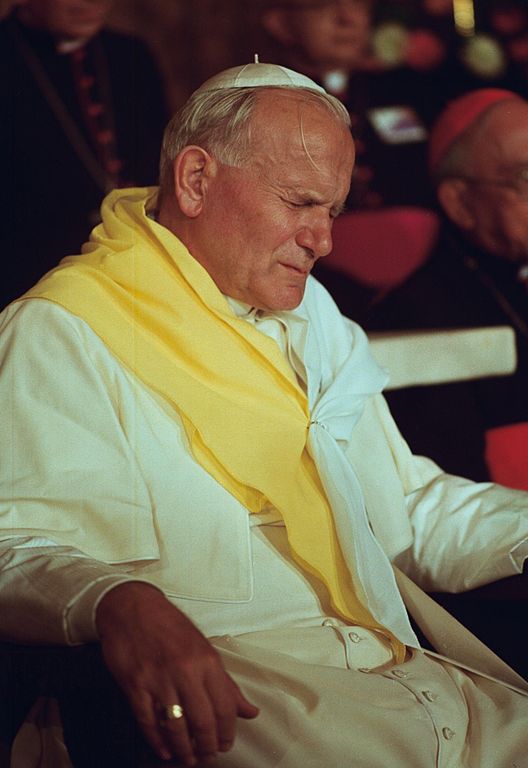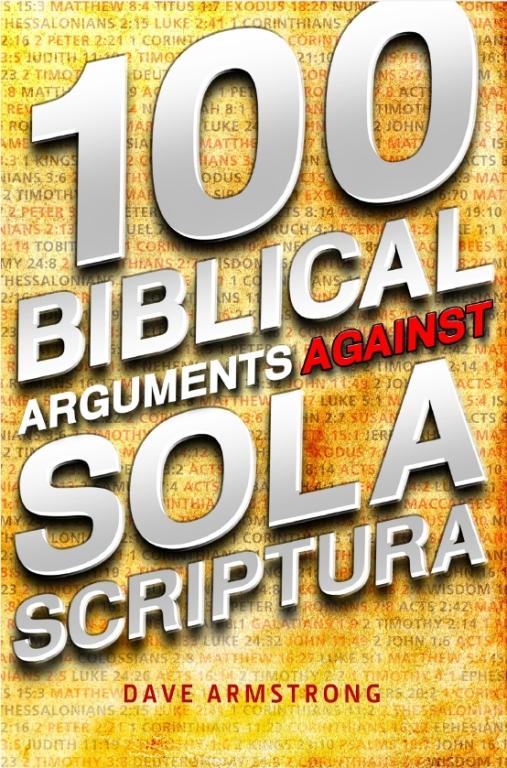Photograph by “ulrikebohr570” [public domain /
Pixabay]
* * * * *
This is a continuation of a previous discussion with a doctoral student in philosophy who is seriously considering conversion to Catholicism, but who struggles with the doctrine of hell, and aspects of God’s function as Judge. His words will be in blue.
* * * * *
Thanks for your reply. To clarify briefly, after having glanced at your reply, I don’t believe in predestination to hell, per Catholic teaching. Catholics believe in predestination to heaven, but without ruling out or superseding our free will. It’s a paradox and not totally understandable by the human mind, but that’s what we believe. It requires faith.
When I speak of there definitely being persons in hell, it is not from reasoning or deduction alone, apart from revelation (i.e., not purely philosophical). It is based on what we know from the Bible, which says that there will be people who are damned, as opposed to those who are saved. The Bible teaches neither universalism nor annihilationism. It also explicitly describes the devil and his angels being tormented in hell indefinitely.
Jesus on several occasions matter-of-factly states that hell is a reality, and that people will end up there. I know that doesn’t cut it in a purely philosophical discussion, but we’re also discussing Catholic theology, which entails a consideration of revelation (which you will have to accept anyway, should you decide to become Catholic). I’m trying to do mostly philosophy here (badly as I might be doing it), because that’s your area, but I can’t totally divorce my position (surely you understand) from revelation and biblical evidences for hell.
I’m assuming, too, that you accept the distinction between foreknowledge and predestination (God being out of time and knowing all things). This doesn’t necessitate predestination. All who end up in hell freely made the choice to do so.
* * *
First of all, I would like to thank everyone for their thoughtful responses. In particular, thank you to David and Dave for replying so thoroughly. I’m in the process of writing a response to Dave in particular. Dave, you make a great many important points and I want to respond to them fairly systematically in another post.
Thank you. Glad to be of any service to you.
However, for the moment, I want to refer briefly to your exchange with Geoffrey and Kevin about universalism etc. I took your advice and had a look at it. To be honest, I found a great deal of what you said there very troubling. So before I post my response to your response to my questions I want to clarify some concerns I have with your statements in this discussion.
Okay.
I have to say that after reading the discussion carefully a number of times I do think that you missed the point of Geoffrey’s question. As it stands, your arguments seem to me to involve a defence of some kind of predestination, whereby some individuals are necessarily destined for hell. Obviously this claim needs to be clarified, which I will attempt to do here.
It seems to me that Geoffrey made his point quite clearly.He is not claiming that necessarily no one has or will choose hell. This would clearly involve a denial of free will. What he is asking is whether it is permissible to believe that as a contingent fact nobody will choose to go there. In each and every case a person may go one way or the other. It is possible, however, that in each and every case the person involved will freely choose God, rather than hell. I presume, because of the discussion of the possibility of a last minute reprieve, that Geoffrey is concerned with the possibility of somebody repenting at the end of their life.
As I replied in another brief post already: granting a belief in revelation and NT revelation in particular (which you have done in large part by accepting most of the Nicene Creed), it is not possible to believe that no one will end up in hell, because the NT clearly states that they will. Several passages imply a great division between the saved and the unsaved; “few” are they who take the Christian road, etc.
The “beast” and the “false prophet” in Revelation are human beings. The Bible tells us that “these two were thrown alive into the lake of fire that burns with sulphur” (Rev 19:20). This is reiterated in chapter 20, with mention of large numbers of people (the dead in Hades) also being consigned to hell:
Revelation 20:10-15
[10] and the devil who had deceived them was thrown into the lake of fire and sulphur where the beast and the false prophet were, and they will be tormented day and night for ever and ever. [11] Then I saw a great white throne and him who sat upon it; from his presence earth and sky fled away, and no place was found for them.
[12] And I saw the dead, great and small, standing before the throne, and books were opened. Also another book was opened, which is the book of life. And the dead were judged by what was written in the books, by what they had done.
[13] And the sea gave up the dead in it, Death and Hades gave up the dead in them, and all were judged by what they had done.
[14] Then Death and Hades were thrown into the lake of fire. This is the second death, the lake of fire;
[15] and if any one’s name was not found written in the book of life, he was thrown into the lake of fire.
Therefore, if you accept biblical revelation, you have no choice but to accept this. You can’t pick and choose what you personally like and don’t like, or what you think God should have done, rather than what He has revealed that He has done and will do. Christianity doesn’t work that way. Why would you think you could totally understand everything, anyway? I understand that a philosophy doctoral student will use his mind more than most of us, and work through things by that method. I have no problem with that in and of itself, as long as the limits of it are acknowledged. But Christianity is not philosophy: it is a religious faith. It is not contrary to reason, but it does go beyond it. Surely you know this, and I don’t have to remind you of it, but I am writing for everyone reading this, too. It requires faith and grace to believe in its entirety.
Your replies clearly negate free will.
They do not. You must have misunderstood them if you got that impression, or you are argung from a supposed logical reduction of my arguments.
You say for example:
“I don’t see much of a distinction between believing in a hell that the reprobate and damned go to and then turning around and saying that it is quite possible that no men go there…”
I’m not sure what I meant in this statement, but I think it is muddled and unclear, looking back at it after 4 1/2 years, and I would like to remove it because if I can’t figure out what I meant, I suspect readers won’t be able to, either. Much more clear is what I wrote immediately afterward:
As I said before: if no men go to hell, then why is so much of the NT devoted to warning men to not end up there by virtue of their rejection of God? Why would the Church tell us that all mortal sins place us in potential danger of hellfire, when in fact, that never occurs because no men end actually up in hell?
That makes no sense to me. It seems to me that if universalism were in fact the true state of affairs and that all men end up in heaven, then we would be informed of this in the Bible, as it is a wonderful truth. Instead, God plays a sort of game by scaring us half to death with all this business about hell and fire and torture and all, and then no one goes there anyway except the devil and his demons.
I find that as silly and implausible as a parent who constantly scares his children with threats of punishment, but never follows through with any of it. Just as the child would not believe the parent when they make such claims, after a few years of that, I wouldn’t trust God’s word, either, if He acted in such a weird, arbitrary fashion with us, involving virtual deception.
I’m not sure whether Geoffrey would agree with the following formulation of an argument for the possibility of an empty hell, but in any case I think the idea is quite simple:
1) There is a hell.
2) If a given person chooses hell then they will go to hell.
3) If a given person does not choose hell then they will not go to hell.
4) Human beings have free will.
5) Since human beings have free will it is not the case that any human being will of necessity go to hell.
6) From this it follows straightforwardly that it is possible that hell is empty because, as a contingent fact, ( not as a necessity) no one has chosen to go there, i.e. everyone has repented before death and been reconciled to God.
And again, I have stated that if the discussion involved merely philosophy and the question of free will, of course your statement about necessary truths and possibilities of human choices would be undeniably true. But this discussion also involves revelation, and that revelation informs us that it is a certainty that in fact many human beings will reject God and thus end up in hell. It’s a fact that is yet to happen: known by God in His foreknowledge and omniscience. God has communicated this fact to us, and repeatedly warns us to avoid the same fate. It’s no less fact because it happens to be “future” to us. It’s not future to God. He knows all that will happen in the future because He is already there.
It is crucial to be clear about where the necessity lies. It is a necessary truth that if a person chooses hell then they will go to hell. So if some group of people chooses hell, then that group will necessarily go to hell. It is a completely different thing to claim that necessarily some group of people will go to hell.
I understand that. I took logic in college too. But it’s not my claim in the first place. It is a statement of fact based on the revelation of what will happen. I made this very clear in the dialogue of mine that you reference, as well, so you should already know that my reasoning is entirely consistent, with regard to incorporation of biblical revelation, which I as a Catholic am not at liberty to deny (nor will you have any such liberty should you decide to become Catholic). As it is, now you accept some revelation and reject other portions of it that you find difficult. That is the logically inconsistent position, not mine.
This only follows if it is necessarily true that some group of people will choose to go to hell. And this flatly contradicts the reality of free will.
As I have not asserted this, it is not a problem of my position that I have to explain.
Geoffrey seems to me to pick up on the troubling consequences of this way of thinking when he says:
“The Catechism condemns the teaching that God predestines anyone to Hell. Therefore there can be no certainty that some are in Hell…”
It seems to me that what you are defending clearly implies that some are predestined to Hell.
Not at all. This exhibits the rather common confusion between predestination and foreknowledge. Since God is outside of time (and I actually took a philosophy of space and time course in college too), He has the ability to state what will happen in the future (acts and facts) back to us for whom the acts are not yet accomplished. So we human beings can make a free choice in the future that God knows (knowing all things). He can tell us now that there are people who will be damned, and He has indeed done so in the Bible. You need not take my word for this.
Your reply to this really does miss the point. You say:
“It follows from the fact of original sin and mortal sin. There are people who fall into the latter, and we are all (except the Blessed Virgin) subject to the former. Therefore there will be people in hell, because there are people in original sin and mortal sin.”
By your own claim, the Catholic Church teaches that the moment of death determines the fate of the soul. Now assuming for the sake of argument that this is true, it would certainly be true that if some person dies in a state of mortal sin they will go to hell. This is just a specification of the general if-then statement above- If some person chooses hell, that person will necessarily go to hell. But you are claiming something else: Some person will necessarily go to hell. But this is completely dependent on whether some person chooses hell, in this case, dies unrepentent and in state of mortal sin. For your view to follow you would need to hold that at least one person will of necessity choose hell. In a concrete sense you would need to be able to say with absolute certainty that a given person has not repented and been reconciled to God. I don’t see how anyone could claim this kind of knowledge of what goes on in someone’s heart. This is predestination plain and simple, and makes a mockery of free will.
It was overstated a bit. I should have said “it is extremely likely” or some such. But the overall thrust of my statement remains true, based on what we know from Revelation. The Bible clearly states that those who are beholden to serious, mortal sin will not inherit the Kingdom (and that means hell, when we harmonize all related biblical teachings) and that unbelievers will be judged and sentenced to eternal darkness and separation from God. Jesus assumes this as a fact on several occasions.
Your subsequent statements only seem to confirm that you hold to some form of predestinationism, in other words that there is some definite group of people who will of necessity be damned.
Incorrect. There is a group that will be damned, as we know from the Bible and as a function of God’s omniscience, but not because they were predestined. They freely chose to reject God.
In your response to me you say clearly that Catholicism is not Calvinism,
Indeed.
that the Catholic Church does not teach that people are predestined to hell.
That’s correct. You can take it from me, as a longtime apologist. If the Catholic Church did teach that, there is a strong likelihood that I wouldn’t have converted to it myself, as I was an Arminian and never a Calvinist.
I am glad if this is the case, but I fail to see how your own statements avoid the charge of defending predestination.
I have amply explained it by now. You may object to God being outside of time or omniscient, for all I know. That would entail an entirely different discussion. You may subscribe to some form of process theology, that is heretical according to Catholicism. Other discussions . . .
* * *
I’d like to make a start on a reply to the various ideas that have so far arisen in this thread. Part of the problem in a discussion like this, especially from my side, as someone who does not share all of the assumptions which my Catholic respondents do,
In the case of hell, it is also historic Protestantism and Orthodoxy that disagree with you, not just Catholicism, because all Christians pretty much agree on this.
is that I can’t assume that people are aware of or understand my own theological, moral, and philosophical presuppositions. What I would like to do is lay out as clearly as possible the main problems I have with the doctrine of hell, more clearly than I have so far, present as clearly as possible my own presuppositions, and then proceed to fairly systematically work through the various thoughtful and generous responses I’ve received.
Okay. And I will counter-reply.
I would like to begin by outlining what I take to be the key claims involved in the dominant or traditional conception of hell. To do this I would like to refer to the work of the philosopher of religion Jonathan L. Kvanvig whose book, “The Problem of Hell” presents many of the issues with admirable clarity. Kvanvig lists the following theses as being central to the traditional concept of hell:
” (1) The Punishment Thesis: the purpose of hell is to punish those whose earthly lives and behavior warrant it.
(2) The No Escape Thesis: it is metaphysically impossible to get out of hell once one has been consigned there.
(3) The Anti-Universalism Thesis: some people will be consigned to hell.
(4) The Eternal Existence Thesis: hell is a place of unending conscious existence.”
Now I basically agree with Kvanvig that this is an accurate account of how hell has, for the most part, been understood throughout the history of Christianity.
Because that is precisely how the Bible has presented it! That’s why Christians have believed this in the first place.
Kvanvig himself argues for a version of annihilationism, in other words the view that the damned simply taken out of existence. I disagree with his arguments here, but the above formulation should give people participating in this thread a fairly clear idea of what I’m objecting to.
Annihilationsim cannot be squared with the biblical data. I knew this 25 years ago, when I used biblical arguments to disprove the Jehovah’s Witnesses position, which is the same.
Now I would like to briefly state some of my presuppositions. Since I will describe my presupposition as far as content is concerned as I go along, I want to begin here by stating what one might call my methodological assumptions, in other words how I approach the Christian faith, how I understand the relation between Faith and Reason, and where some of my basic influences lie.
Good.
This is meant also to be a partial response to David’s contention that my ” fixation with reasoning to a conclusion” is causing me to stumble.
Insofar as you don’t also include revelation in the analysis, I think he is correct. It’s impossible for any Christian to intelligently discuss hell without taking that into account. But as you clarify, I think the problem may not be so much “hyper-rationalism” as it is “selective revelation.” You accept part of revelation and reject another part, and the criterion is reason and your feelings about things like hell. The orthodox Christian replies that this is unreasonable and arbitrary.
David made a number of points about the relation of reason, and thus philosophy, to religion. His view seems to be that reason is flawed as an approach to religious truth.
He’s certainly less inclined to philosophy than I am, but I think it would be most unfair to categorize him as “anti-reason” in any way. David can speak for himself, but I think he means it in the sense that I described above. He wants to harmonize faith, revelation, and reason, as I do. We usually have different approaches in our answers on this forum, as the folks here are well aware (and which I think is wonderful), but on that broad principle we are in complete agreement, I can assure you.
I have to say I disagree strongly with this view. I certainly have specifically philosophical reasons for disagreeing, which it wouldn’t be appropriate to go into here. But quite apart from this this view does not seem to me to accurately reflect the profound influence which philosophical thought has had on Catholicism. Thomism is one obvious example. I mention this because my own philosophical convictions on a great many questions are basically Thomist, with a strong element of phenomenology. David made the point that philosophy students often make the mistake of legislating for God, of thinking that they can judge God’s actions and so on. Now I think this criticism is to a large extent valid, and not only of philosophy students but also great philosophers. There is a lot of titanic presumption in the history of philosophy ( e.g. Hegelianism). At the same time I think this charge is unfair with respect to my own concerns.
I hope so, and I’ll accept your word on that.
I would never presume to legislate what God Himself can or cannot do. But none of what I say is directed at God, rather it is directed at human conceptions of God with which I disagree.
But that is a fine line, because in this case the human conceptions are directly derived from revelation, which we believe is from God. If one accepts the validity and truthfulness of the NT, hell is part of the package. It is as impossible to extract from it as it was for Thomas Jefferson to eliminate all the biblical miracles from his ridiculous Bible. To do so guts the NT and it is no longer the NT after that ransacking of it.
When a philosophical theologian says that God cannot do evil, he is not telling God what he can or cannot do, he is simply clarifying a truth which follows necessarily from the nature of God, if we the virtually universally accepted view that God is Perfectly Good.
Yep. No problem there. And this is grounded in Revelation as well.
In the same way if someone says that God cannot make a square circle, he is not legislating for God, or claiming to know God’s mind better than God.
That’s right. I made that very argument in my first installment, as I recall.
Similarly, my claim is not that I know better than God, but rather that on my understanding of God’s nature ( which is not merely some arbitrary personal construction but informed by many years of studying) the doctrine of hell seems to be incompatible with God’s nature.
And I deny that just as vigorously.
There are certain things which I accept without philosophical argument. I believe and accept everything contained in the Nicene Creed, with two provisos: 1) I would have a different interpretation of what is involved in God’s judging the quick and the dead than Catholics; 2) I have doubts as to whether the ‘ One Holy Catholic and Apostolic Church’ refers exclusively to the Roman Catholic Church.
To do so one must accept revelation. You have done that in large part. Yet when it comes to hell that same revelation isn’t sufficient for you. This is the incoherence that I see in your position thus far.
I do not question what I take to be the central truths of the Christian faith: the Trinity, The Fall, the Son’s Incarnation, Death and Resurrection, The Last Judgment and so on, not only because I believe them to be true by faith, but because they enlighten my reason, because the beauty and moral grandeur of these idea inspires me unlike any other religious conception. So faith and reason are not for me at odds with each other.
Great.
On the other hand there are clearly things in both the Old and New Testament which are morally unacceptable: one obvious example is the fact that slavery is not only never condemned in the Old Testament, but is clearly practiced by some of Israel’s prophets. In the New Testament similarly, there is St. Paul’s injunction that slaves should obey their masters. Now it seems obvious to me that by any sane contemporary standards of morality St. Paul was in error, in so far as he did not speak out against the institution of slavery and even, in some places seems to give it a partial acceptance.
Slavery in the Bible (in most instances) was essentially being an indentured servant. Paul’s conception of slavery was not identical to the chattel slavery of early America. But this is a sidetrack. See these articles:
Development or Reversal? (Slavery) (Avery Cardinal Dulles)
A Response to John Noonan, Jr. Concerning the Development of Catholic Moral Doctrine (Usury, Marriage, Slavery, Religious freedom) (Patrick M. O’Neil)
On Slavery in the Old Testament (Luke Wadel)
Catholic Encyclopedia: Slavery and Chrisrtianity
Catholic Encyclopedia: Slavery, Ethical Aspect of
This is just one instance of many, especially as pertains to the Old Testament, where God Himself is presented, at least if read literally, as counselling the Israelites to commit genocide against their enemies, killing every last woman and child.
This is perfectly defensible as acts of judgment on God’s part (Who has this prerogative as our Creator). See:
How Could a God of Love Order the Massacre of the Canaanites?
Shouldn’t the Butchering of the Amalekite Children be Considered War Crimes?
To me it is obvious that it is moral duty for any one who believes in God, but for Christians in particular, to reject those aspects of Scripture which are clearly immoral ( slavery) as representing not an unchanging truth, but rather the historically limited understanding of people ( even Saints) of the time, or, as in the case of the Old Testament, reject a literal interpretation of God’s actions and find an interpretation which saves God from the calumny of seeing Him as a genocidal tyrant.
Have you read intelligent defenses of the biblical outlook on these matters, such as the ones I have presented to you presently? Gotta read both sides. Christianity can always offer some sort of answer. it may be regarded as implausible or false, but we do always at least offer some defense of our beliefs, which counts for something, I think. Many belief-systems are unable or unwilling to sustain an apologia after just one strong critique.
It is one thing to appeal to mystery when it is a matter of doctrines ( such as the Incarnation) which exceed our understanding but which can in no way be accused of being immoral. It is quite another thing to appeal to mystery when it is a matter of ideas, like slavery, or like the idea that God is a wrathful and jealous tribal deity, which are clearly immoral by any reasonable human standards.
The latter is merely a deliberate anthropomorphism on God’s part (rather common in the OT and a well-known aspect of Hebrew poetry and sacred literature), and poses not the slightest problem.
Furthermore, there is the fact that concepts central to the issue of hell, such as free-will, are simply not given any clear articulation in the New Testament. There is no doubt that we have free will, but what this means and how we are to understand this, how it relates to God’s will, to issues of God’s knowledge of the future and so on, is simply not a Scriptural matter. All the complex accounts of these issues developed over the centuries by Christians represent a development which, while we may believe it is divinely inspired, is nevertheless rational and philosophical, or philosophical-theological.
To the contrary, there is some explicit biblical indication, right from Jesus, even of Middle Knowledge (a sophisticated philosophical concept), which I have noted in the past, in my defense of same (being a Molinist myself):
Matthew 11:21-24
[21] “Woe to you, Chora’zin! woe to you, Beth-sa’ida! for if the mighty works done in you had been done in Tyre and Sidon, they would have repented long ago in sackcloth and ashes.
[22] But I tell you, it shall be more tolerable on the day of judgment for Tyre and Sidon than for you.
[23] And you, Caper’na-um, will you be exalted to heaven? You shall be brought down to Hades. For if the mighty works done in you had been done in Sodom, it would have remained until this day.
[24] But I tell you that it shall be more tolerable on the day of judgment for the land of Sodom than for you.”
There is also considerable data concerning God being out of time, with no beginning or end, and omniscient. I’ll refrain from getting into all that now, but rest assured that I can produce plenty of it, if needs be.
As such one cannot invoke faith to defend them from rational scrutiny.
I certainly can invoke revelation (Mt 11:21-25) and faith in same to defend Middle Knowledge, as well as other passages showing His omniscience, foreknowledge, sovereignty, providence, omnipotence, eternity and being outside of time, etc.
The fact is that even the Scriptures need to be interpreted, we do not simply passively take in a content which is obvious and clear as to its meaning, as the history of Christianity amply points out. When people defend hell using concepts like Justice, eternal existence of souls, and so on, they are dealing in human concepts, concepts whose sole meaningful content derives from the way in which they have been developed and articulated throughout the history of thought. So I think that you simply cannot avoid discussing these issues at the level of rational argument.
Nor can you avoid dealing with how Scripture presents hell as a plain, simple fact (especially Jesus Himself).
So much for my assumptions as to the relation of philosophy, or rather reason, and faith. But I should make it clear that the source of my doubts about hell is not purely rational. The most important theological influence on my thoughts in this regard comes from St. Isaac the Syrian, also known as St. Isaac of Nineveh, a hermit and ascetic universally recognised in the Orthodox Church for his personal sanctity, although his universalism was rejected by the Orthodox Church.
That should tell you all you need to know. It is the corporate Church that decides what is orthodox. It is not any one saint or even collection of them, no matter how saintly. We ought not go looking for saints who agree with our predispositions and biases. The Catholic and Orthodox approach is to accept an authoritative Church. If you continue to insist on an unbibical universalism you can always join the Unitarian Universalists. If you think annihilationism is true, you have the option of Seventh-Day Adventists (trinitarianian) or Jehovah’s Witnesses or Christadelphianism (both Arian in Christology).
If that is your methodology: to pick and choose a religious group based on their agreement with your previous philosophical conclusions, then that is thoroughly Protestant and individualistic, and you have many options available to you. But the Catholic accepts the entire package of Catholic dogma in faith, as something far greater than himself. St. Thomas Aquinas and Cardinal Newman (my own intellectual hero) both made this very clear.
Virtually all of my views about hell either come from St. Isaac, or if they were developed independently, received their confirmation in his teachings, in particular as expressed in his Ascetical Homilies.
Every heresy originally started with one person.
I won’t describe his views, but will instead provide a link to an article on St. Isaac by Bishop Hilarion Alfeyev of Vienna, who has written on of the few scholarly books on St. Isaac’s thought.
Okay; thanks. But I warn anyone who would want to read this, that it is considered rank heresy to deny the existence of hell.
Next I would like to articulate the main issues I have with regard to this conception of hell. These questions for the most part directly relate to things said by respondents in this thread.
1) The problem of God’s Justice and its relation to His Mercy. There are various issues here:
(1a) Is the relation between Justice and Mercy in God such that both are equally essential to His nature, or does one of them exceed the other in importance?
Equal, I believe.
(1b) A slightly different but related question is whether both God’s Justice and His Mercy exist on the same level, whether, to put it metaphorically, they are the two sides of a balanced scale, or whether one of them exceeds the other not simply in the sense that the scale is weighted in its favour, but in the sense that it includes both sides in a higher synthesis.
Two sides of a balanced scale. Every parent understands this when we punish a child for their own good and follow it up by explaining and hugging them.
This is important to my argument because I believe that it is a basic mistake to view Justice and Mercy as equally essential to God’s nature.
So you demote Justice?
I’ve chosen the metaphor of a scale quite consciously because of its association with the concept of Justice. It seems to me that people who emphasize the equal, but competing claims of Justice and Mercy in fact, implicitly subordinate both to an overarching conception of Justice. The very idea that there is a conflict between Justice and Mercy, involves a conception of a weighing up of relative merits which is at odds with the radically gratuitous nature of God’s love.
Who says there is a conflict? They are simply two different but perfectly harmonious things.
My deeply held conviction is that Mercy, which is just another word for Love, transcends the apparent opposition between Justice and mercy (with a small m).
On what basis do you assert this “conviction” and build systems of thought upon it?
Obviously we need new words to express this without confusion, but the basic idea should be clear. Mercy is not one of the sides of the scale, it is the whole scale itself. Or perhaps more accurately, it is the still point from which the two sides of the scale hang.
Everything God does is out of love. I agree if that is what you mean. It is loving even for God to allow human beings to have free will, which many will use to reject Him. That is not only loving it is extremely humble (just as the beginning of the Incarnation and the crucifixion were). It’s because God loves us that He gives us free will and abides by the decisions we make as a result. But if we can freely serve Him we can also freely reject Him, and God won’t force anyone (out of love) to serve Him against their will. Thus hell follows inexorably from this granted free will which is an aspect of God’s love for His creatures.
But it also follows from justice, insofar as evil deeds and adoption of a stance of thorough rebellion against God and goodness do not go unpunished for all eternity. Thank God for that, too. I couldn’t live a day with just the abominable outrage of abortion alone if I didn’t believe in a cosmic justice, or God’s judgment.
There is nothing new or morally compelling in the ethic of strict justice or retribution. The desire to avenge wrongs, to extract justice with “an eye for an eye” is I think a tendency as old as humanity itself.
God’s justice is not vengeance. You’ve been greatly affected by secular thinking in this respect, to adopt such a perspective. And that is very common in post-“Enlightenment” philosophical environments, of course.
If this was in fact what Christ taught then the Christian ethic would bring nothing new to the world, and would be inferior in certain ways to others ( for example, in failing to express the same universal compassion for the non-human world, e.g. animals, as found in Buddhism and Jainism).
Jesus lays it all out in Matthew 25. Revelation 19:11,15 shows Him coming back to earth with a sword in His mouth, to judge the nations. Nor was Jesus a pacifist. See also:
Matthew 16:27 (RSV) For the Son of man is to come with his angels in the glory of his Father, and then he will repay every man for what he has done.
JOHN 5:22,27 (KJV) For the Father judgeth no man, but hath committed all judgment unto the Son . . . (27) And hath given him authority to execute judgment also, because he is the Son of man. (cf. Mt 3:10-12: John the Baptist)
JOHN 9:39 (KJV) And Jesus said, For judgment I am come into this world, that they which see not might see; and that they which see might be made blind.
ACTS 10:42 (KJV) . . . it is he which was ordained of God {to be} the Judge of quick and dead.
2 TIMOTHY 4:1 (KJV) I charge {thee} therefore before God, and the Lord Jesus Christ, who shall judge the quick and the dead at his appearing and his kingdom;
Christ’s injunction that we love our enemies, forgive those who sin against us is, conversely, an ethic of unprecedented radicality and beauty. This is not an ethic of justice.
Injunctions as to personal behavior do not cancel out the social responsibility of Christians to oppose injustice. This is a common secularist, pacifist perspective, but it is not biblical. The same Jesus of the Sermon on the Mount also praised the faith of Roman centurions and told the disciples to purchase a sword (Luke 22:36).
Even more telling is the fact that God, in the Person of Christ Crucified forgives human beings the ultimate sin against His very own Person. Human beings murder God Incarnate and His response to this is ” Father forgive them for they know not what they do”. This is far removed from any considerations of strict justice.
He forgives them personally (or more correctly, asks God the Father to forgive them), but they still have to face judgment if they are unrepentant. They knew not what they did. That is one thing. But God will judge us for what we knowingly do, if it is evil.
We presuppose on this forum that one accepts the Bible as God’s inspired revelation. You argue, contra Scripture, that God has no concept of justice, cannot judge, that He is (?) supposedly a pacifist; cannot take any human life in judgment, etc. It’s no wonder you don’t believe in hell, because you have taken out the justice that is its fundamental rationale, along with free will, causing poor, deluded souls to prefer it to heaven.
If anything tells against the idea that our God is a God of strict justice it is this. The people who reviled Christ, the Romans who scourged Him, the Jews who demanded His crucifixion, had far more reason to believe in Him that any one today. They saw Him, witnessed, or at least heard by direct testimony of the miracles wrought by Him, and heard Him preach unmediated by centuries of theological interpretation and disagreement. And yet they rejected Him, and Crucified Him, and He forgave them, despite the fact that it would be very unlikely that they first repented.
You miss the point. They didn’t know what they were doing. But in Peter’s sermons and Paul’s epistles they made it clear that there was blame to Jews (not just ones at the crucifixion or calling for it) who rejected Jesus and His claim as Messiah and Lord:
Acts 3:12-19
[12] And when Peter saw it he addressed the people, “Men of Israel, why do you wonder at this, or why do you stare at us, as though by our own power or piety we had made him walk?
[13] The God of Abraham and of Isaac and of Jacob, the God of our fathers, glorified his servant Jesus, whom you delivered up and denied in the presence of Pilate, when he had decided to release him.
[14] But you denied the Holy and Righteous One, and asked for a murderer to be granted to you,
[15] and killed the Author of life, whom God raised from the dead. To this we are witnesses.
[16] And his name, by faith in his name, has made this man strong whom you see and know; and the faith which is through Jesus has given the man this perfect health in the presence of you all.
[17] “And now, brethren, I know that you acted in ignorance, as did also your rulers.
[18] But what God foretold by the mouth of all the prophets, that his Christ should suffer, he thus fulfilled.
[19] Repent therefore, and turn again, that your sins may be blotted out, that times of refreshing may come from the presence of the Lord,
Acts 4:8-12
[8] Then Peter, filled with the Holy Spirit, said to them, “Rulers of the people and elders,
[9] if we are being examined today concerning a good deed done to a cripple, by what means this man has been healed,
[10] be it known to you all, and to all the people of Israel, that by the name of Jesus Christ of Nazareth, whom you crucified, whom God raised from the dead, by him this man is standing before you well.
[11] This is the stone which was rejected by you builders, but which has become the head of the corner.
[12] And there is salvation in no one else, for there is no other name under heaven given among men by which we must be saved.”
This precise message was why Stephen, the first martyr, was killed:
Acts 7:51-53
[51] “You stiff-necked people, uncircumcised in heart and ears, you always resist the Holy Spirit. As your fathers did, so do you. [52] Which of the prophets did not your fathers persecute? And they killed those who announced beforehand the coming of the Righteous One, whom you have now betrayed and murdered,
[53] you who received the law as delivered by angels and did not keep it.”
I’ll refrain from documenting what Paul wrote about this, too, for space’s sake.
2) Even if we assume that Justice is a primary value, equal to Mercy, there remains the question whether it is just for anybody to be consigned to hell. There are various issues here too:
(2a) The first issue here was stated in a fairly representative way by Dan:
“To sin against something that is infinitely good deserves infinite punishment or reparation. Man, being finite cannot make infinite reparation. Because God is merciful, we do not need to. To have contrition and going to Confession is enough. But there are those who reject the Sacraments. During the Last Judgement, there will be the select few that enter into Paradise because they have lived just lives. God being just cannot award eternal pleasure to the just without “awarding” eternal punishment to the unjust.”
Kvanvig describes just this sort of argument in his book, and in the article on Heaven and Hell in the Stanford Encylopaedia of Philosophy ( I give the link at the bottom of this post.) He writes:
“According to defenders of the traditional view, punishment deserved is also a function of the status of the individual one has wronged, and they argue that all wrongdoing constitutes a wrong against God, and that wronging God is as bad a thing as anyone could do- they are infinitely bad thereby justifying an infinite punishment”.
I think I already anticipated this in my analysis of souls being intrinsically eternal. If they reject God, then they exist eternally apart from Him, and that entails a suffering because being absolutely separate from God with none of His grace any longer present is an unutterably horrific thing.
Kvanvig himself presents a number of telling arguments against this view.
The first of these is relevant to another issue I will discuss later, so I will mention it only briefly here. He makes the fairly obvious point that it is simply not true, in the vast majority of cases, people ” do not intend to harm God or to defy Him in some way when they act wrongly”. On any defensible notion of “intention” it is not simply implausible, but patently false to say that all people who act wrongly thereby intend to defy God or sin against Him.
The Bible teaches (particularly in Romans 1 and 2) that those who are judged have knowingly rejected God. Kvanvig can speculate all he likes, but he is contradicting plain Scriptural testimony.
Our everyday sort of intuitions about intention and culpability recognise that intention is crucially important in determining the moral and legal gravity of an act, hence the distinction between murder and manslaughter, among other things.
Exactly. And that is how the Bible describes those who are judged and damned:
Romans 1:18 For the wrath of God is revealed from heaven against all ungodliness and wickedness of men who by their wickedness suppress the truth.
Romans 1:20-21 Ever since the creation of the world his invisible nature, namely, his eternal power and deity, has been clearly perceived in the things that have been made. So they are without excuse; for although they knew God they did not honor him as God or give thanks to him, but they became futile in their thinking and their senseless minds were darkened.
Romans 1:32 Though they know God’s decree that those who do such things deserve to die, they not only do them but approve those who practice them.
One could give many everyday examples of this, but the obvious one that jumps out is the case of atheists. It is absurd to say that in sinning the atheist intends to defy God, for the simple fact that the atheist does not believe in the existence of God. I’m not talking here about militant atheists like Richard Dawkins but virtuous, thoughtful atheists who despite their best attempts to understand and affirm belief in God cannot do so.
I have argued that it is possible for atheists to be saved if they are truly ignorant, and that not all atheists are evil people, so I agree. Many times they are not ignorant, however, and their “atheism” is just a cover and pretense for true hatred of God, just as Romans 1 describes. I know; I’ve debated many of them.
The same obviously goes for small children and for those who, through no fault of their own have never been exposed to a credible form of Christianity.
Exactly. That’s why Catholic theology allows for that, following Romans 2 and other such passages.
So there is obviously something missing here, some further assumption which motivates the view expressed by Dan and characterised by Kvanvig.
According to Kvanvig, and I agree with him here, it is the assumption of a kind of ownership relation between God and His creatures. The idea is, one can wrong a person by destroying their property without being aware who the owner is, and without intending to wrong them.
Of course. That is not at issue. Christians believe that knowledge of God is innate in human beings. People can unlearn that, however, by secular education, bad experiences, following a path of sin and corruption, etc.
He also makes the important point, in his book, though not in the article, that this sort of thinking is a kind of relic of feudal relations, that it conceptualises the relation between God and human beings along the lines of the relation between an absolute monarch and his subjects. I cannot see how Dan’s position could possibly be defended without this sort of underlying paradigm being assumed: namely, that God, as absolute sovereign has complete and arbitrary power over his subjects,
He has power over those He created. God gave life and can take it away. That is His prerogative. He didn’t have to create us at all. He is under no obligation to save anyone, either, after the human race rebelled against Him (the Fall). He does so out of love and mercy. We owe our life and existence to Him. Your mistake is to conclude that this power is arbitrary. It’s not at all.
and that a sin against God is so heinous because of God’s status in the cosmic hierarchy.
God is God. A=A: the first law of logic.
This seems to me to be fundamentally at odds with the Gospels’ picture of Jesus Christ. We are not presented here with the picture of a proud sovereign but with a God Who takes the form of a servant, who washes the feet of sinners, and Who dies, as far as the external world is concerned, the shameful death of a common criminal.
He also speaks of judgment and reiterates that He Himself is a judge and will judge sinners on the Last Day because he is one with the Father.
Quite apart from this objection, namely that this conception of God involves the projection of onto God of certain outdated and discredited political assumptions about authority,
The usual anthropological condescending disdain of the Bible and ancient Jewish religion that is observed so often . . . It won’t help you progress in your inquiry at all, to adopt this approach.
there is also the serious problem of making any sense of the idea of an “infinite sin”.
The unforgivable sin is to call evil good and reject God’s plan of salvation for human beings. That causes separation from God, which is hell.
This is not as clearly stated by Dan as by Kvanvig, but it is clearly implied by his view. He works explicitly with the image of a scale of justice: sins against God, who is infinitely Good, are infinitely bad, therefore they deserve infinite punishment.
We don’t need to get into all that to defend hell.
The first problem with this I have already discussed. If sins against God are infinitely bad, then one must ask, for whom? The only possible answer is, for God. God on this view, judges all sins as sins against His own Person, and as infinitely bad. This position makes no sense unless one assumes that God is the kind of being Who can take offence, something which I find absurd. It makes sense in the context of a political relation between a sovereign and his subjects, because here we are obviously dealing with an instance of wounded pride, which demands satisfaction. I think this is deeply mistaken. Great political rulers, especially absolute rulers have for the most part been monsters of titanic pride and any tendency to conceptualise God along these lines is fundamentally flawed, as well as being at odds with the Christ of the New Testament.
Your argument at this point rests, with all due respect, on a series of fallacies, disproven by the Bible and, I think, natural law reason and common sense. And to the extent that revelation is accepted, it contradicts many facts at every turn, too. Even if the NT is accepted as an accurate historical account of Jesus and His teachings, you have huge internal difficulties.
3) Next I would like to respond to Dave’s statement that God gives every person adequate grace and opportunity to accept Him and thus to avoid hell. I think this is highly doubtful.
Then you again discount the data of revelation. This creates an incoherence in your stated position. One cannot pick and choose from revelation. It stands together as a whole.
The fact is that countless people deal on an everyday basis with all manner of things which seriously undermine their ability to exercise their free will. People in their millions live in conditions of unimaginable poverty, violence and oppression, so much so that God would have to be unbelievably callous to fault such people for not believing in Him. It is one thing to fault a healthy, well educated, person living in relative luxury in a western country for holding to a facile atheism. It is quite something else to condemn someone for being unable to believe in God if they have lived a life in which there has been virtually no sign of love, or justice or meaning.
God doesn’t judge as men do: outwardly only. He knows the secrets of our hearts, so that He judges justly and fairly. No one will be sent to hell because they lacked sufficient knowledge (Romans 2:15-16). All of this speculation is, then, a moot point.
More seriously still is the fact that millions of children, who can in no way be held morally responsible for the situations in which they find themselves, are born into grinding poverty, virtual slave labour, sexual and physical abuse and so on.
Ditto.
I don’t know if Dave intended to imply that everyone gets not only an adequate chance, but also an equal chance. I sense that this was implied, but I may be wrong. If it was then I think these considerations refute it fairly obviously- people are not given an equal chance, far from it.
They get an equal chance at salvation, because God takes all these factors into account. “To whom much is given, much is required.” Obviously, they don’t get an equal chance at the opportunities and luxuries of earthly life, but we’re talking about salvation, not earthly happiness. It is the fact of heaven after this life, that puts our sufferings here in proper perspective (Romans 8:18: “I consider that the sufferings of this present time are not worth comparing with the glory that is to be revealed to us.”).
Even if Dave did not mean this, and meant simply that everyone has an adequate chance, adequate to their circumstances, I don’t think this is true. Take the example of a child who endures horrendous abuse, poverty, lack of education. Let’s say that as a result of this the child grows up to be an adult who is not able to form the right beliefs about God, which in this context would mean beliefs in consonance with those of the Roman Catholic Church. To say that on the basis of such a life this person would be competent to decide their eternal destiny, that it would be fair or just for them to be consigned to hell on the basis that they had ample opportunity to get it right, simply beggers belief. To say this is to speak in abstractions. Human life is not that simple.
I think this is all a red herring. I believe in a perfectly merciful, loving, and just God. I don’t lose one second’s sleep wondering about whether His judgment of souls will be fair or not. Of course it will be. Jesus reveals the nature of God and His love.
4) This links up directly with another very significant problem- the fact that the Catholic Church makes it, in my view, unconscionably easy to end up in hell because it sets the conditions for entry far too low. Previously there has been some discussion of the question whether somebody could be eternally obstinate, so hard hearted as to be impervious to any divine influence. Now I would be far more willing to contemplate the possibility of hell if we were talking about paradigmatic cases like Hitler, where we have conscious, and unrepentent evil on a massive scale, perpetrated by a human being who, though it is hard to imagine, was probably not insane. Although even in such cases it makes no sense to speak of an “infinite sin”, they at least begin too approximate this.
But the fact is that the Church teaches that it is possible to go to hell for dying unrepentent in a variety of sins, which to my mind do not by any stretch of the imagination approximate a severity for which eternal damnation would be a just response.
God looks at the whole picture. It’s not Catholicism that sends people to hell for being unrepentant sinners, but the Bible:
1 Corinthians 6:9-10 Do you not know that the unrighteous will not inherit the kingdom of God? Do not be deceived; neither the immoral, nor idolaters, nor adulterers, nor sexual perverts, nor thieves, nor the greedy, nor drunkards, nor revilers, nor robbers will inherit the kingdom of God.
Galatians 5:19-23 Now the works of the flesh are plain: fornication, impurity, licentiousness, idolatry, sorcery, enmity, strife, jealousy, anger, selfishness, dissension, party spirit, envy, drunkenness, carousing, and the like. I warn you, as I warned you before, that those who do such things shall not inherit the kingdom of God. But the fruit of the Spirit is love, joy, peace, patience, kindness, goodness, faithfulness, gentleness, self-control; against such there is no law.
Your problem, then, is again with the Bible, not Catholicism, which is merely following it. And if you have a problem with the Bible, you have a problem with God Himself: the real one: not some imagined Being dreamt up and “projected” by ancient tribes (as anthropologists love to mock and disparage). God has revealed Himself. It is up to us to accept or reject this. I’ve given you more than enough myself, from revelation, to establish these things. Your task is to be willing to accept these truths, in faith, with the help of God’s grace.
Take the case of fornication, of sexual activity outside of marriage. Now I don’t deny that this is sinful in the sense of “missing the mark”, that it fails to achieve the full meaning of human love and sexuality, that it is imperfect. At the same time there are many people who live in lifelong completely faithful and monogamous sexual relationships. This includes of course people who believe in God, and who in many other areas of their lives are very moral people. While I am quite prepared to agree that such a state is not ideal, and that it would be better for them to be married, it seems absurd to me that their committed, loving life long union should be understood as a fundamental rejection of God deserving of eternal damnation (whether understood as punishment or as the absence of God).
If they know full well it is wrong, and continue to do it with full consent of the will, then they are in distinct danger of hellfire. If they truly don’t know, then it is still sin, but not mortal sin (see 1 John 5:16-17). We make that very distinction that you call for. Your real beef is with the Calvinists and other Protestants who often don’t make the distinction and discount the subjective and willful element of sin as having an effect on relative culpability (as in civil law).
I could give many, many other examples. One other particularly galling one is the fate of infants or embryos who die unbaptised. As I understand it the Church has made no definitive statement on this. I recall reading somewhere that the Catholic Church has recently cast doubts on the traditional ( though as I understand never dogmatically stated) belief that unbaptised infants go to Limbo. Obviously the issue arises because of the Catholic belief in original sin. I can’t even begin to imagine how someone could take this question seriously. It is so patently unjust and so at odds with any sane standards of moral culpability that a God Who would consign unbaptised infants to hell would be a monster.
I don’t think He does, nor does the Church: not in this crass, absurd sense that you despise (as I do also). Again, it is the Calvinists who believe in double predestination, including infants, with whom you have the beef here.
The list goes on. What about the fate of Saints of other religions? Is Gandhi in hell? Is the Buddha? Will the countless saints and holy men of other religions who knew nothing of Christ live for an eternity of suffering without God?
Not necessarily at all. See my many papers about salvation “outside the Church” on my Ecumenism page.
Christian tradition is as far as I know fairly unanimous regarding the eternal destiny of the Prophets of the Old Testament, even though it would be very difficult to argue that they believed in Christ, or held any of the distinctive doctrines of the Christianity, let alone the specific views of the Roman Catholic Church. If they don’t go to hell, what justice would there be in sending the saints of other religions to hell, when by all fair accounts they often equal Christians in their asceticism, their love of God and neighbour, and their sanctity?
All depends on what they know and how they acted on it (Romans 2).
This has already got too long so I will end it here, to be continued later as replies come in…
You need to figure out your opinion as to what revelation teaches on any or all of these matters. You seem to reject revelation wherever it disagrees with your present opinions. That makes no sense, given your self-described espousal of most of the Nicene Creed, which is clearly itself based on revelation; not just natural reason. It remains your primary internal problem of incoherence and inconsistency, as I see it, anyway.
Thanks for the dialogue. I hope I have given you some food for thought, and have helped move you towards orthodox Catholicism. But God’s grace and human free will are ultimately the key factors as to who believes and who doesn’t.



























